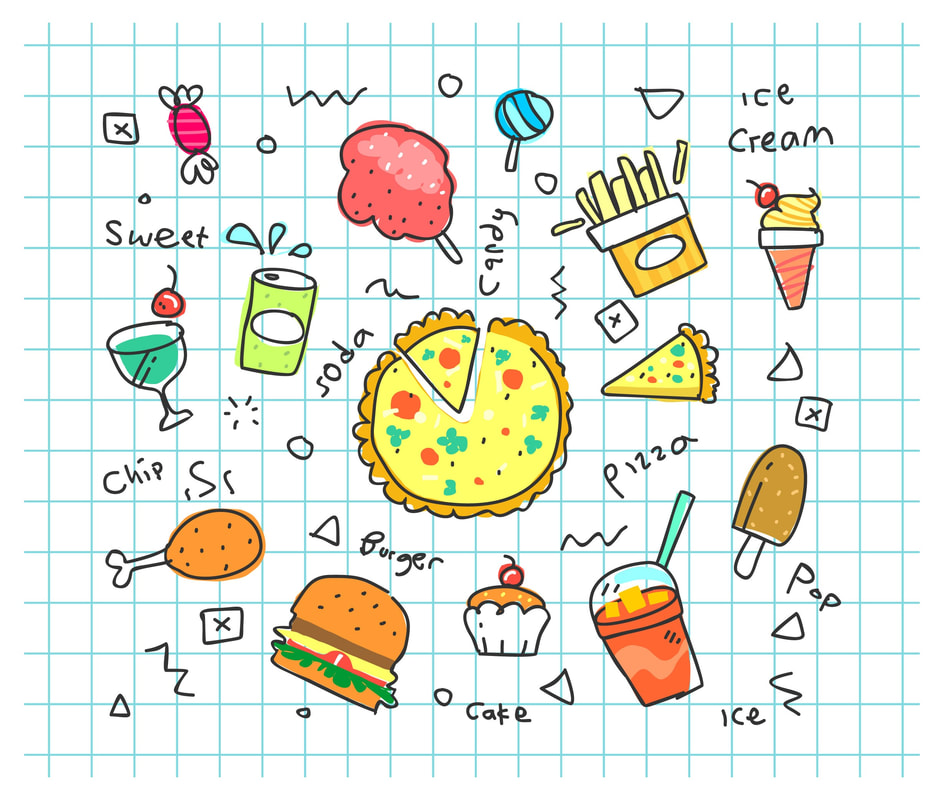What is non-hungry/emotional eating?Non-hungry eating is a broad category that essentially refers to eating for reasons other than hunger, such as eating out of boredom or habit. Emotional eating is a form of non-hungry eating in which individuals use food (or liquid calories) to cope with emotions. For the purpose of discussion, the term non-hungry eating will be used to refer specifically to boredom/habitual eating, while emotional eating will be used to refer to eating that is driven by emotions. Obviously there is some overlap between these two categories, but it's still worth differentiating between them since the motivation behind each can be quite different. What causes non-hungry eating?Boredom, habit, and/or access to food is often the driving force behind mindless non-hungry eating. The desire to eat is driven primarily by external cues. Eating a bucket of popcorn at the movie theatre. Devouring a hotdog and cotton candy at the ball park. Finishing off an entire bag of potato chips while binge watching Netflix. Any of these sound familiar? In the case of non-hungry eating, there is generally a trigger. A visual cue. A smell. A ritual that has forever paired a food or eating behavior with a specific activity, like pumpkin pie on Thanksgiving or cake on our birthdays. It could also be driven by the taste of food and/or how that food rewards the brain. What causes emotional eating?Emotional eating is a type of non-hungry eating that generally goes beyond boredom or habit. Food becomes a coping mechanisms. We eat as a way to deal with an emotion. Sadness, anger, frustration, fear. These emotions make us uncomfortable, so we eat in an attempt to blunt that emotion and feel better, if only in the moment. Unfortunately, the foods we choose to self-medicate are often high in fat and sugar, and the relief we get is often only temporary at best and may even leave us feeling worse in the end. Ironically, like drugs and alcohol, fat and sugar have addictive qualities. And while eating a cookie (at least on the surface) is arguably less harmful than taking drugs, in its most severe form, emotional eating can lead to binge eating, a serious eating disorder, as well as weight gain and chronic health diseases like heart disease and diabetes that have detrimental effects on our mental and physical health. Interestingly, emotional eating tends to be more of a problem for women than men. There may be many reasons for this. For example, traditionally women were more likely to be the ones shopping for and preparing foods. A woman also experiences monthly fluctuations in powerful hormones that contribute to cravings for fatty and sugary foods. Furthermore, hormonal shifts associated with pre-menopause and menopause may come into play. Women are also the fatter sex because their bodies were designed to not only provide calories for themselves but also their off-spring. Finally, although this is changing somewhat, the objectification of women's bodies has likely placed pressures on them that contribute to an unhealthy relationship with both their bodies and food. Biological basis for non-hungry eatingBoredom/habitual eating is generally caused by habit. And habits are powerful. They are the brains attempt to conserve valuable and limited resources. It's clear that our ability to switch into autopilot is essential to functioning in a complex world. We'd be overwhelmed without this automatic mode. Unfortunately, many habits are not consistent with our health goals and do not serve our best long-term interests. Emotional eating also has a physiological basis. Once upon a time, the threats we faced didn't just feel like life and death, they were. As a result, when under stress, physical or emotional, our body releases hormones like cortisol and adrenaline. Cortisol in particular can have a profound impact on not only hunger, but the foods we choose to satisfy that hunger. During times of stress, we tend to crave fatty, sugary, high-calorie foods. Our distant ancestors likely had limited access to both sugar and fat, and the foods that did contain these macro nutrients also contained many other essential micro nutrients like vitamins, minerals and phytonutrients. We also had to work a lot harder for our calories back then, unlike today when we are literally surrounded processed foods high in sugar, fat, and calories but lacking in nourishment. Elevated cortisol levels can also impact the quality and quantity of our sleep which further increases cortisol levels. Disrupted sleep also affects leptin and ghrelin, two additional hormones that regulate hunger and satiety. It's a vicious cycle. Finally, increased cortisol levels favors weight gain particularly in the midsection. This belly fat, also referred to as visceral fat, is associated with chronic systemic inflammation, which has been implicated in cancer, heart disease, Alzheimer's, auto immune disorders and diabetes among others. Finally, hormonal fluctuations can impact cravings and food choices as well as how our bodies process those calories. SummaryNon-hungry and/or emotional eating leads to the consumption of food (often unhealthy food) to fulfill a need other than hunger. Most of us engage in some form of non-hungry and emotional eating. It's common and has a biologic/physiologic basis. Occasionally eating out of boredom or because we are stressed is unlikely to cause significant harm, unfortunately, for many, this type of eating is all too common, ultimately contributing to weight gain, the inability to lose weight, and/or the development of life-style related diseases. In a nutshell, it keeps many of us from achieving the best version of ourselves.
0 Comments
Your comment will be posted after it is approved.
Leave a Reply. |
AuthorShaun Taylor Bevins Archives
April 2020
Categories
|

 RSS Feed
RSS Feed